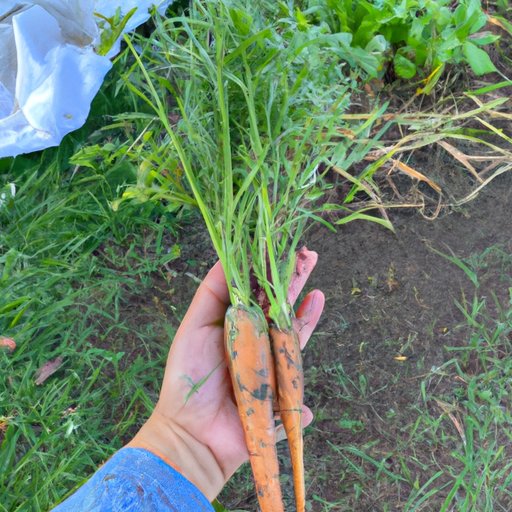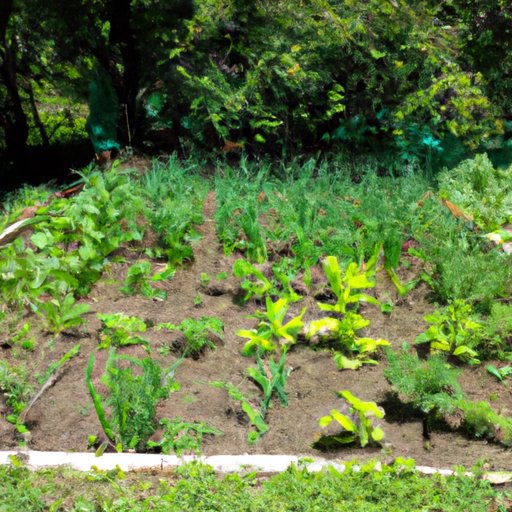Introduction
Gardening is a great way to get outside, enjoy nature, and produce healthy food for your family. One of the most popular garden vegetables is the carrot, which has a sweet flavor and crunchy texture that make it a favorite for both kids and adults. Growing carrots is relatively easy, but maximizing yields can be a challenge. Fortunately, there is a technique called companion planting that can help you achieve bigger and healthier harvests.
Companion planting is the practice of interplanting two or more species of plants together in order to increase their productivity. It works by taking advantage of the beneficial relationships between certain plant species, such as those that attract pollinators, provide nutrients to the soil, or repel pests.
Intercropping with carrots can have many benefits, including increased yields, improved pest control, and better soil fertility. In this article, we’ll explore the best plants to grow alongside carrots, how to maximize yields through proper soil preparation, fertilizer and nutrient requirements, water management, and weed control. We’ll also look at some organic gardening tips for successful cultivation.
The Best Plants to Grow Alongside Carrots
When intercropping with carrots, it’s important to choose companion plants that will not compete for resources like sunlight, water, and nutrients. Here are some of the best plants to grow alongside carrots:
Radishes
Radishes are a great choice for companion planting with carrots because they grow quickly and do not require much space. Radishes also improve the soil structure and can help keep away pests like cabbage maggots, which can wreak havoc on carrot crops.
Onions
Onions are another great companion plant for carrots because they can help deter pests and improve soil fertility. Onions also have a strong smell that can mask the scent of carrots, making them less attractive to pests.
Beans
Beans are a great choice for companion planting with carrots because they can fix nitrogen in the soil, making it more fertile for other plants. They also provide shade and reduce the amount of weeds in the garden.
Peas
Peas are a great choice for companion planting with carrots because they can provide shade and help retain moisture in the soil. They also help prevent weeds from taking over the garden, and can help improve soil fertility.
Lettuce
Lettuce is a great choice for companion planting with carrots because it grows quickly and does not take up much space. Lettuce also helps keep the soil moist and prevents weeds from taking over the garden.
Spinach
Spinach is another great choice for companion planting with carrots because it can help improve soil fertility and deter pests. Spinach also grows quickly and does not take up much space.
Garlic
Garlic is an excellent choice for companion planting with carrots because it can help deter pests and improve the flavor of carrots. Garlic also has strong antifungal and antibacterial properties that can help protect carrots from disease.

Maximizing Yields by Planting with Carrots
In order to maximize yields when intercropping with carrots, it’s important to prepare the soil properly, provide adequate fertilizer and nutrients, manage water correctly, and control weeds. Here are some tips for maximizing yields when planting with carrots:
Proper Soil Preparation
When intercropping with carrots, it’s important to prepare the soil properly. The soil should be light and sandy, with a pH between 6.0 and 7.0. It’s also important to add plenty of organic matter to the soil to improve its structure and fertility.
Fertilizer and Nutrient Requirements
When intercropping with carrots, it’s important to provide adequate fertilizer and nutrients. Carrots need plenty of nitrogen, phosphorus, and potassium to thrive. Adding compost or manure to the soil can help provide these essential nutrients.
Water Management
When intercropping with carrots, it’s important to manage water correctly. Carrots need plenty of water, but too much can cause the roots to split. Be sure to water the plants deeply, but not too often, and avoid overhead watering.
Weed Control
Weeds can compete with carrots for resources, so it’s important to control them. Hand-weeding is the best way to remove weeds, but mulching can also help prevent them from germinating. Be sure to mulch around the carrots to keep the soil moist and discourage weed growth.

Organic Gardening Tips for Growing Carrots and Their Companions
Organic gardening is a great way to produce healthy, chemical-free food for your family. Here are some tips for successfully growing carrots and their companions organically:
Building Healthy Soil
Organic gardening starts with building healthy soil. Adding plenty of organic matter to the soil, such as compost or manure, is essential for improving its structure and fertility. It’s also important to rotate crops and avoid tilling the soil too deeply, as this can damage the soil structure.
Choosing the Right Variety
When growing carrots, it’s important to choose the right variety. Short, round varieties are best for intercropping, as they don’t require a lot of space. Longer varieties are more suitable for traditional row planting.
Staggering Plantings
When intercropping with carrots, it’s important to stagger the plantings. This will help ensure that the companion plants don’t compete for resources, and will also help maximize yields. Plant the companion plants first, then sow the carrot seeds 1-2 weeks later.
Rotating Crops
It’s important to rotate crops when growing carrots and their companions. Rotating crops helps prevent diseases and pests from building up in the soil, and can also help improve soil fertility. Try to avoid planting carrots in the same spot each year.
Conclusion
Intercropping with carrots is a great way to maximize yields and ensure healthier crops. By choosing the right companion plants, preparing the soil properly, providing adequate fertilizer and nutrients, managing water correctly, controlling weeds, and following organic gardening tips, you can ensure success when growing carrots and their companions.
(Note: Is this article not meeting your expectations? Do you have knowledge or insights to share? Unlock new opportunities and expand your reach by joining our authors team. Click Registration to join us and share your expertise with our readers.)
